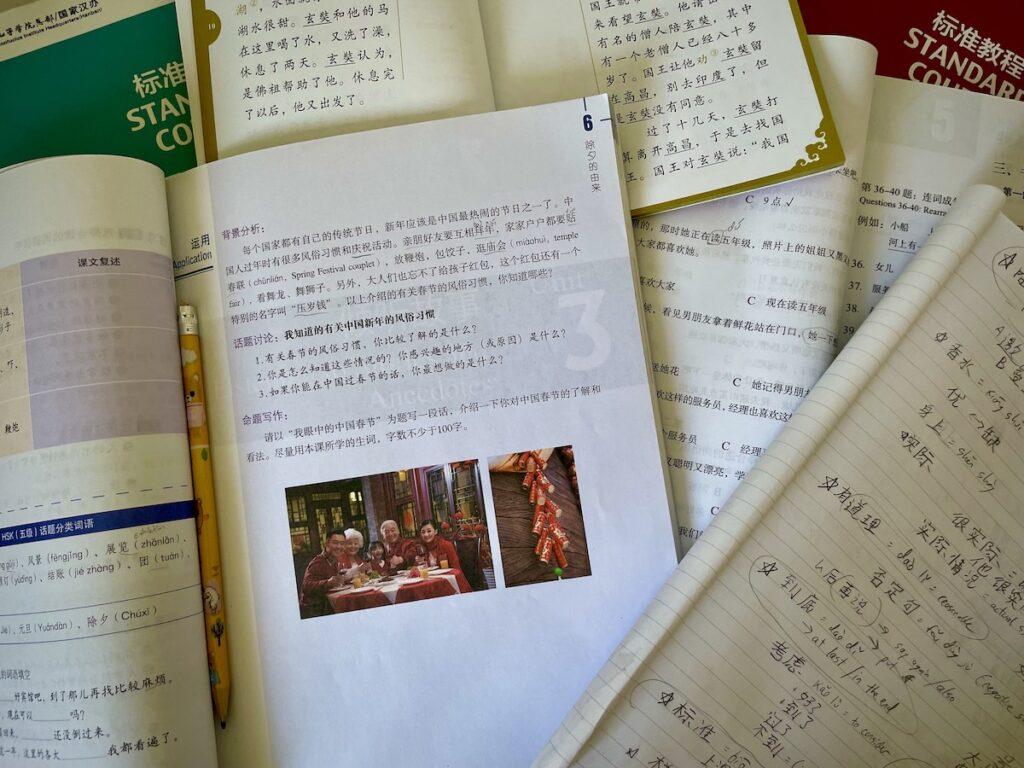There is a lot of bad advice out there about learning Chinese. Most of it comes from professional bloggers and influencers who seem to be dedicated to convincing the rest of us we’re losers for not working five hours a week, living in Bali, and knowing twenty languages. It’s okay. You’re not a loser, you’ve just been getting bad advice.
Now, to be fair, I’m not a linguist or an expert on cognitive brain function or anything like that. I’m just a guy trying to learn Chinese. And even though I’m getting better and better, I’m still far from fluent.
Check out my guide on How To Learn Chinese

I’ve shared my personal experience going from being an absolute Chinese beginner to being able to discuss such complex topics as my favorite Harry Potter movie in Mandarin. Hopefully, my experience can help you to learn Chinese as much as it’s helped me.
Learning Chinese is Easy

The first bit of bad advice is that learning Chinese is easy. There’s a whole industry out there devoted to making people think Chinese is an easy language. Maybe it is if you already know a related language, but if you’re a native English speaker, it’s very, very difficult.
This ain’t Spanish or French where you’ve got a buttload of words and grammar that are basically the same. The logic and structure of the language are totally different. There are tones, characters instead of an alphabet, and to top it all off, there isn’t really a word for “yes.”
Chinese isn’t something you can expect to just “pick up.” There are people who have lived here for years and still can’t speak a word. It takes a lot of effort and hard work.
On the one hand, I appreciate the sentiment behind people who say “oh learning Chinese is easy.” I think it comes from a good place, trying to make it seem less scary or intimidating. They’re trying to get more people to study it. On the other hand, people who start studying Chinese expecting to be fluent in a month or whatever some website is selling them are going to be very disappointed. They might give up.
Don’t give up. You should understand that Chinese is a difficult language. Be aware of that, but also know the difficulty is part of what makes it much more rewarding when you finally understand something you couldn’t before.
“Just Talk to People”
I hear this bit of bad advice all the time, not just in relation to learning Chinese, but to any language. “Oh, you don’t need to study. Just start talking to people and you’ll pick up the language.” It seems like good advice, at first. Afterall, isn’t that how we all learned our first languages? Just by listening and practicing in real life conversation?
But, this advice is terrible if you are shy or have any kind of social anxiety. It can be stressful enough to talk to strangers in your native language. Imagine trying to do it in your second or third language.
When I first came to China, I pushed through my shyness and tried “just talking to people.” I would smile and say “你好” to any Chinese person I could. They would then inevitably reply with something that sounded to me like “blah blah blah blah.” After enough awkward miscommunications, my shyness has returned with a vengeance.
I think the “just talk to people” approach is great once you reach an intermediate level. If you have enough of a base your brain will start to pick up things through context, and you’ll learn a lot very quickly. But… you need that base to build on before you can do this. Otherwise, you’re just going to hear nonsense that your brain will ignore.

Don’t Learn the Grammar/There is No Grammar
I have read articles online that say Chinese has no grammar. This is very stupid. Do you really think Chinese people just go around saying words in random order?
No. Of course Chinese has grammar, just like any other language.
Some people will also say that Chinese grammar is basically the same as English. This advice is usually combined with the “learning Chinese is easy” nonsense. Chinese grammar is not the same as English.

Yes, both languages have a subject, verb, object structure. When it comes to very simple sentences. But, you are very quickly going to want to say more complex things than “this is a ball” (这是一个球).
Chinese actually has a very strict grammar. There are various rules for where to put things that are completely different than in English. And then there are things we don’t even really have, “resultative compliments” for example, that are super common in day-to-day speech.
Some people say you should just learn the vocabulary and then let the grammar fall into place. This is okay, until you run into a structure like “我一点儿也不累”, which if you didn’t know the specific grammar structure, you might translate as “I a little (or more) also not tired.” Maybe you can guess it means “I’m not even a little bit tired” but it’ll be easier if you just learn the grammar.
Don’t Learn the Tones

As you may or may not know, Mandarin Chinese is a tonal language. That means that words change their meaning based on whether you say it with a high flat pitch, or with a low tone. This is actually pretty common in languages around the world. We just don’t really do it in European languages.
Some (European) people will tell you don’t need to learn the tones. This bit of bad advice has been spreading around for a while, and I think it’s severely damaging a lot of people’s ability to learn Chinese. It’s led to numerous miscommunications and embarrassment. It might even be the reason U.S.-Chinese relations have deteriorated so much in the last few years.
The tones are a fundamental part of pronunciation. It’s the difference between talking about your mother and talking about your horse.
Imagine if you were learning English and you decided it wasn’t important to learn the difference between pronouncing the letter “D” and “B”. They are close enough, right? The whole thing woulb de a bisaster. Nodoby woulb de adle to unberstanb you.
Chinese already has a lot of words that sound the same. The tones are the only thing separating the number four and death. Yes, they’re very difficult at first, but once you get used to them, it’s not so bad.
Don’t Learn the Characters
I’ve met quite a few people who lived in China for years and can speak fluently. Yet, when it came time to leave a building, they walk around in confused circles because they can’t read the sign for “exit.”
The Chinese characters might be the most difficult thing about the language for English speakers. However, once you start learning them, they are also the most interesting and rewarding. Don’t listen to anyone’s bad advice that you don’t need to learn the characters when you’re learning Chinese.
True, you can get by without them. Chinese has its own system of pronunciation using the pinyin. Pinyin is easy to learn, and super helpful. However, Chinese people don’t use it beyond first or second grade. They learn the characters.
Why? Take the classic poem “Lion-Eating Poet in the Stone Den” for example. In pinyin, the poem is called “Shī-shì shí shī shǐ”. The entire poem is just “shi”. It’s completely impossible to understand in pinyin, or even in spoken Mandarin for that matter. Now, if you use the characters you get “施氏食獅史”. I’ll be honest, I don’t know all them, but I can at least understand that they’re all distinct words.
The characters are also incredibly helpful for learning new words. Each one is like a neatly packaged mnemonic device that can be really helpful when you’re learning vocabulary. You’ll soon realize, for example, that every time you see “车” has something to do with a vehicle. 火车 is ‘train’. 公交车 is bus, and so on.
I’ve been using Skritter for a while, and I think it’s genuinely very helpful for learning Chinese characters. If you use this link, they’ll give me some money. If you don’t want me to have money, that’s okay, you can sign up another way. I still recommend it.
Oh, and “exit” is 出口, in case you were wondering.

Click here to buy Skritter. I think it works good.
What’s Some Good (or At Least Not Bad) Advice for Learning Chinese?
I’d say the most important thing is to stick with it. Find yourself some classes, preferably mostly in Chinese, and study, study, study. Put in at least a little bit of time every day. You can even immerse yourself in videos. Ten minutes a day is better than cramming for three hours once a week. You’ll have days, maybe weeks, when you feel like you aren’t making any progress. Then, all of a sudden, you’ll find yourself in the middle of a conversation with the cleaning lady about her health problems.
The above advice might not be the quick and easy solution you were hoping for. Sorry.
On the bright side, sometimes the most difficult things are the most worthwhile. After years of studying, that conversation with the cleaning lady about her health problems is going to be one of the most rewarding conversations of your life.

